This list of SEO software is intended to help marketers, webmasters, and other professionals who are interested in search engine optimization. It contains links to external, third-party websites that provide lists of tools for SEO.
Table of Contents
List Of Seo Software
1. Ahrefs: SEO Keyword Tool
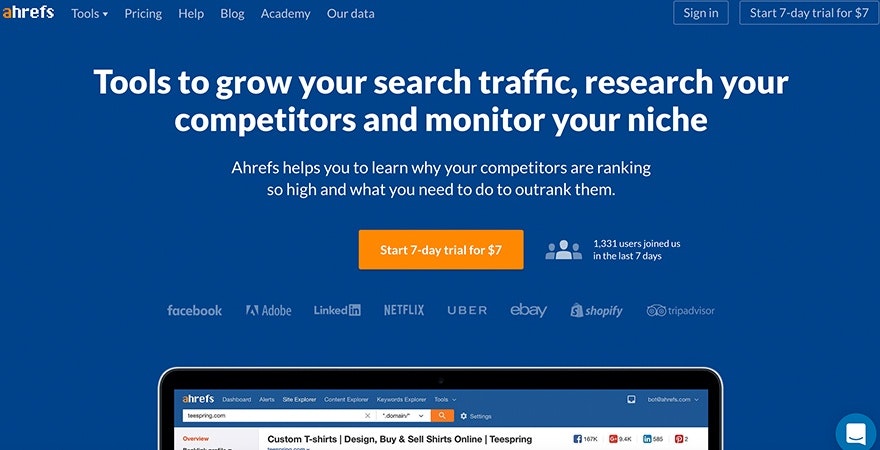
Ahrefs is one of the most recommended SEO tools online. It’s only second to Google when it comes to being the largest website crawlers. SEO experts can’t get enough of Ahrefs’ Site Audit feature as it’s the best SEO analysis tool around. The tool highlights what parts of your website need improvements to rank better in search engines. From a competitor analysis perspective, you’ll likely use Ahrefs to determine your competitor’s backlinks to use them as a starting point for your own brand. You can also use this SEO tool to find the most linked to content within your niche, check and fix broken links on your website,and get an overview of your best-performing pages (so you can see what information is drawing in the visitors).

Syed Irfan Ajmal, a Growth Marketing Manager at Ridester, loves the SEO keyword tool Ahrefs. He shares, “Ahrefs is surely our most favorite tool when it comes to various facets of SEO such as keyword research, rank tracking, competitor research, SEO audit, viral content research and much more. We add our site and those of our competitors to it. The tool then shows us the sites which have backlinked to our competitors but not us. This helps us find great link opportunities. But this wouldn’t have been so easy if Ahrefs didn’t have the largest database of backlinks. Ahrefs has been instrumental in getting our site ranked for several major keywords, and getting us to 350,000 visitors per month.”
2. Google Search Console: Top SEO Tool
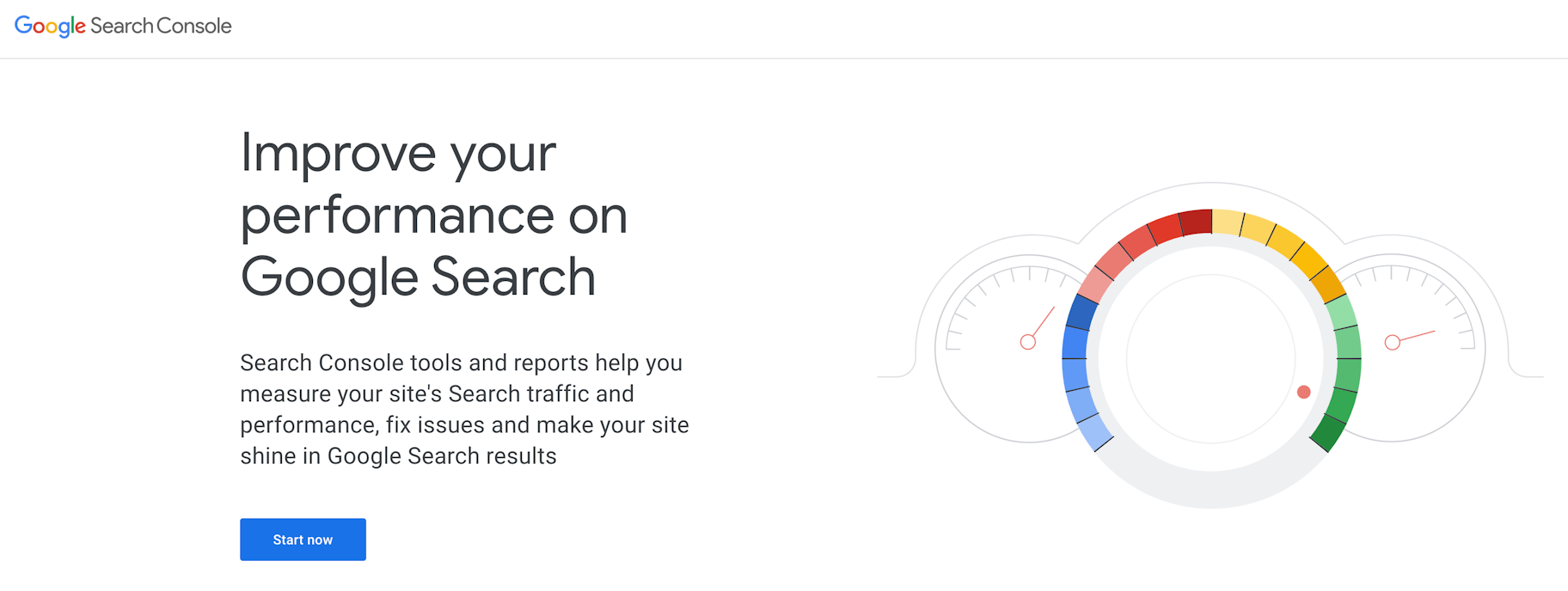
Offered for free to everyone with a website, Google Search Console lets you monitor and report on your website’s presence in Google SERP. All you need to do is verify your website by adding a code to your website or going through Google Analytics and you can submit your sitemap for indexing. Although you don’t need a Search Console account to appear in Google’s search results, you can control what gets indexed and how your website is represented with this account. As an SEO checker tool, Search Console can help you understand how Google and its users view your website and allow you to optimize for better performance in Google search results. It’s especially useful for new websites as it lets site owners submit web pages for search indexing.
3. SEMRush: Marketing SEO Tools
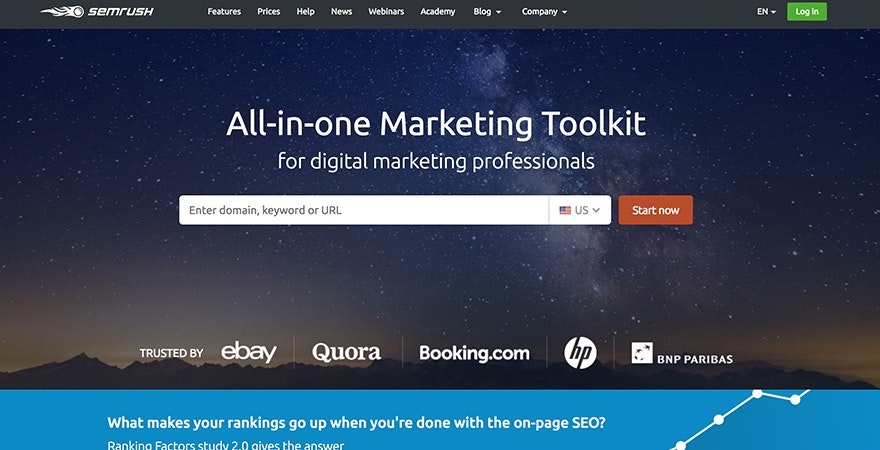
Marketing SEO tools like SEMRush tend to be fan favorites in the SEO community. Experts love that they let you easily assess your rankings as well as identify changes and new ranking opportunities. One of the most popular features of this SEO tool is the Domain Vs Domain analysis, which allows you to easily compare your website to your competitors. If you’re looking for analytics reports to help you better understand your website’s search data, traffic, or even your competitors, you’ll be able to compare keywords and domains. The On-Page SEO Checker tool allows you to easily monitor your rankings and find some recommendations on how to improve your website’s performance.

Liraz Postan, Senior SEO & Content Manager at Outbrain, recommends SEMRush as one of the best SEO tools. She says, “My favorite SEO tool is SEMrush with the feature of “organic traffic insights”. This feature lets me see all my leading articles with one dashboard, along with related keywords, social shares and word count. This gives me a quick overview of what’s working and where to optimize. I generally use SEMrush on my daily work, love this tool, and love using its site audit to optimize our site health. We improved our site health by 100% more since we started using SEMrush, and we increased conversions by 15% more from our content pages.”
4. KWFinder: SEO Keyword Tool
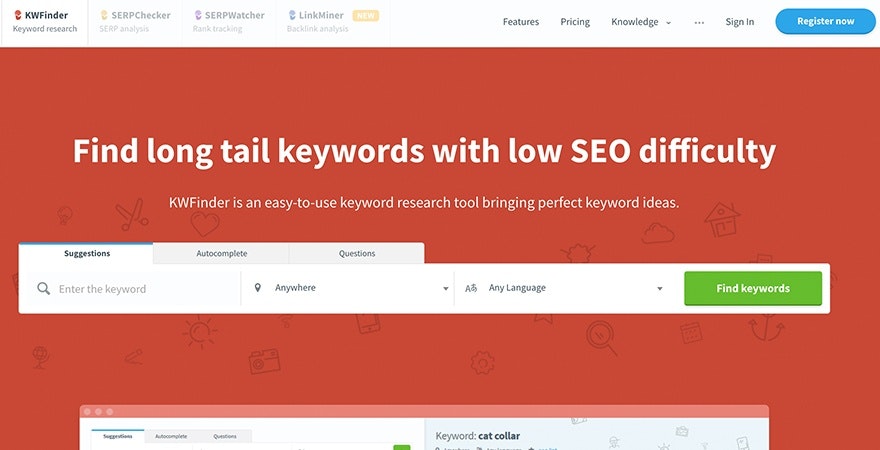
An SEO keyword tool like KWFinder helps you find long-tail keywords that have a lower level of competition. The experts use this SEO tool to find the best keywords and run analysis reports on backlinks and SERP (Search Engine Results Page). Their Rank Tracker tool helps you easily determine your ranking while tracking your improvement based on one key metric. Plus, if that’s not enough, you’ll get a ton of new keyword ideas to help you rank your website even higher.
 George Perry, an SEM Specialist at Bandwidth, raves about KWFinder. “I like that not only does it show me information on the keyword that I was searching for, but pulls in good suggestions for related terms, and how they compare (volume, CPC, difficulty, etc.) to the term I originally looked at. I’ve been able to help my clients target not only those big, pie in the sky vanity terms, but to better target those terms that are lower in the funnel and more likely to convert, allowing me to target them through focused content that answers the questions they’re actually asking.”
George Perry, an SEM Specialist at Bandwidth, raves about KWFinder. “I like that not only does it show me information on the keyword that I was searching for, but pulls in good suggestions for related terms, and how they compare (volume, CPC, difficulty, etc.) to the term I originally looked at. I’ve been able to help my clients target not only those big, pie in the sky vanity terms, but to better target those terms that are lower in the funnel and more likely to convert, allowing me to target them through focused content that answers the questions they’re actually asking.”
5. Moz Pro: SEO Software
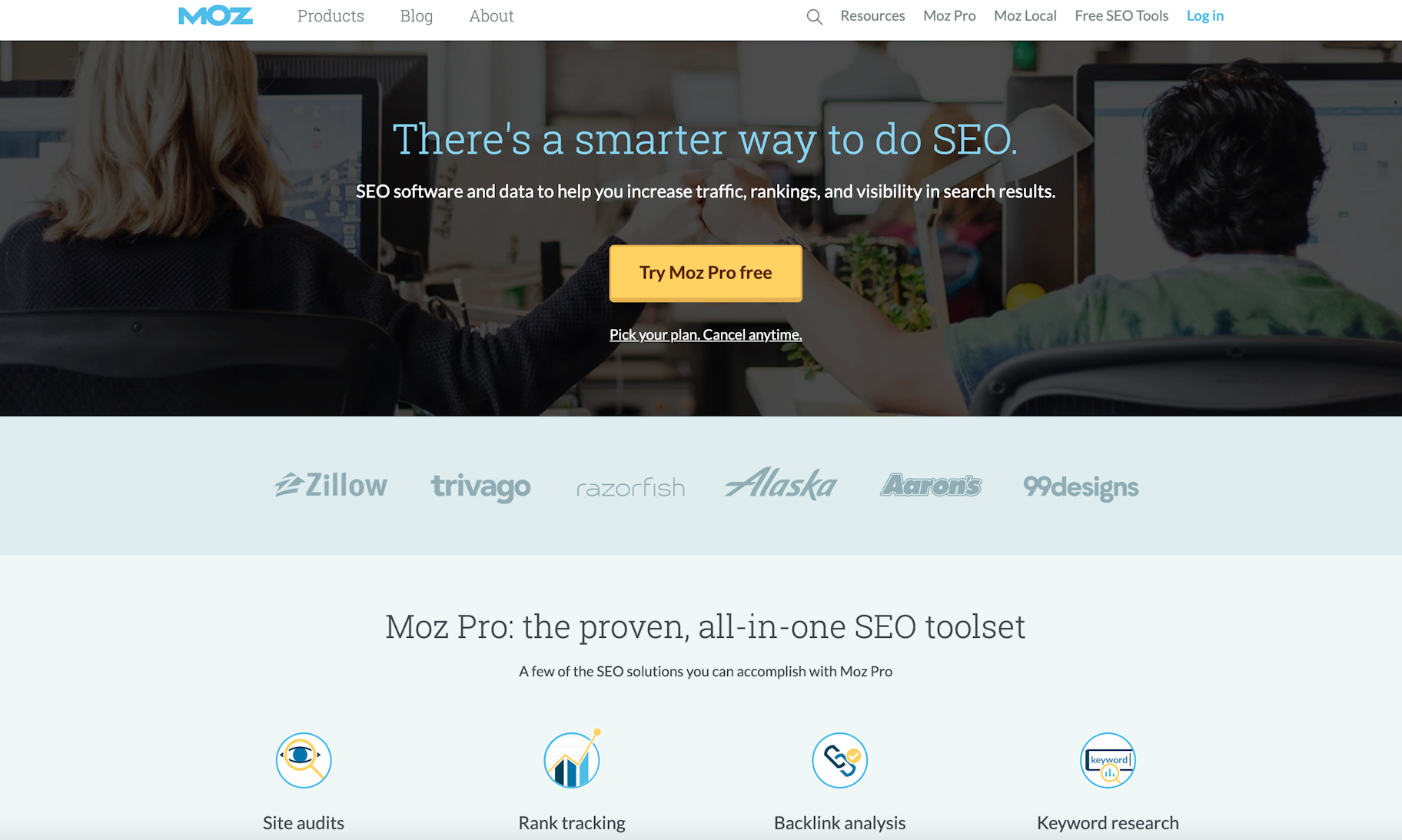
SEO software Moz Pro keeps popping up as one of the best SEO tools that experts actually use. Some specialists raved about how Moz was always up to date despite Google’s regular algorithm changes. Others praised Moz’s chat portal that allows them always to get an insightful response to every question asked. Whether you’re looking for keyword recommendations or a site crawl, Moz is a full-service powerhouse. You can get great insights into how your website is performing but also how to improve it. They also have a free MozBar toolbar that you can download to see your website’s metrics while browsing any page. If you’re looking to learn more about SEO, you should also consider checking out MozCon, their annual conference.

Keri Lindenmuth’s, Marketing Manager at Kyle David Group, go-to SEO tool is none other than Moz Pro. She says, “My favorite feature of the tool is its ‘page optimization feature.’ It tells you exactly what steps you can take to improve the SEO of every single page on your website. For example, it will tell you to ‘Include your keyword in this page title’ or ‘Add an image with a keyword alt tag.’ This tool has substantially improved our client’s business simply by the fact that it gives increased transparency. We can compare their site’s traffic and optimization to that of their competitors. We can see which pages and search terms their competitors perform well in and alter our web practices to compete against theirs. Without a tool like Moz, SEO really becomes a guessing game. You have no idea where you’re doing well and where you can use improvement.”
6. Ubersuggest: Keyword Tracking Tool
Ubersuggest, developed by Neil Patel, is a free keyword finder tool that helps you identify keywords and also the search intent behind them by showing the top ranking SERPsFrom short to long-tail phrases, you can find the right terms to use on your website with hundreds of suggestions from this free great keyword tool. Metrics Ubersuggest includes in its reports are keyword volume, competition, CPC, and seasonal trends. Great for both organic SEO and paid PPC, this tool can help you determine if a keyword is worth targeting and how competitive it is.
7. Answer The Public: Free SEO Tools

Free SEO tools like Answer The Public allow you to easily find topics to write about for your blog. I’ve used this tool in the past to create content around specific keywords to better rank online. Say you’re in the ‘fitness’ niche. You can use this free SEO tool to create content around keywords like fitness, yoga, running, Crossfit, exercise and cover the entire spectrum. It’s great for finding featured snippet opportunities. Say you hire a freelancer to create content for you, all you need to do is download this list and send it over to them. And it would only take you five minutes, making it one of the most efficient ways to come up with SEO topics for new websites.

Matt Jackson, Head of Content at Wild Shark, loves free SEO tools like AnswerThePublic. He shares, “One of my favorite tools when compiling SEO content for a site is AnswerThePublic.com. The best feature of the tool is that it presents a list of the questions that web users are asking about a particular keyword. If I’m running out of genuinely useful content ideas, or if I’m compiling an FAQ page, it provides invaluable guidance as to what, exactly, people are searching for. It is not only useful for SEO content, it means that our clients can answer questions on their site, minimizing the number of customer service calls they receive and giving greater authority to a page and the overall business. And here’s a quick tip: prevent neckache by hitting the Data button, rather than straining to read the question wheel.”
8. SpyFu: Free SEO Tools

While SpyFu has an amazing premium version, many of our experts raved about its free features. If you’re just starting out, you can easily grow into the paid features as you start succeeding. You can easily view the number of times a keyword gets searched each month while easily determining the ranking difficulty for that keyword. You can also do some research on your competitors to determine which keywords they use. Additionally, you can search your competitor’s, or your own, website to easily see how many organic keywords they have, how many monthly clicks they get, who their paid and organic competitors are, the campaigns they’re running with Google Ads, and more. It’s one of the most detailed SEO analysis tools on the market.

Adele Stewart, Senior Project Manager at Sparq Designs, can’t get enough of SEO software SpyFu. She shares, “I have used SEMrush and Agency Analytics in the past, but SpyFu has the one-up on my client’s competitors. All of SpyFu’s features are great, but my absolute favorite is the SEO Research feature. You’re able to plug in a competitor’s domain and pull up information on their own SEO strategy. You can see what keywords they pay for vs. their organic standings, review their core keywords, and even assess their keyword groups. Using SpyFu has been integral to my client’s SEO successes. There’s so much more to track and report on, plus I don’t have to put in as much effort in research as I did with other SEO software. SpyFu pulls the information I need and organizes reports in a way that is presentable and understandable to my clients. I’ve already seen increases in indexing and rank for keywords that we didn’t even think of.”
9. Woorank: SEO Ranking Tool
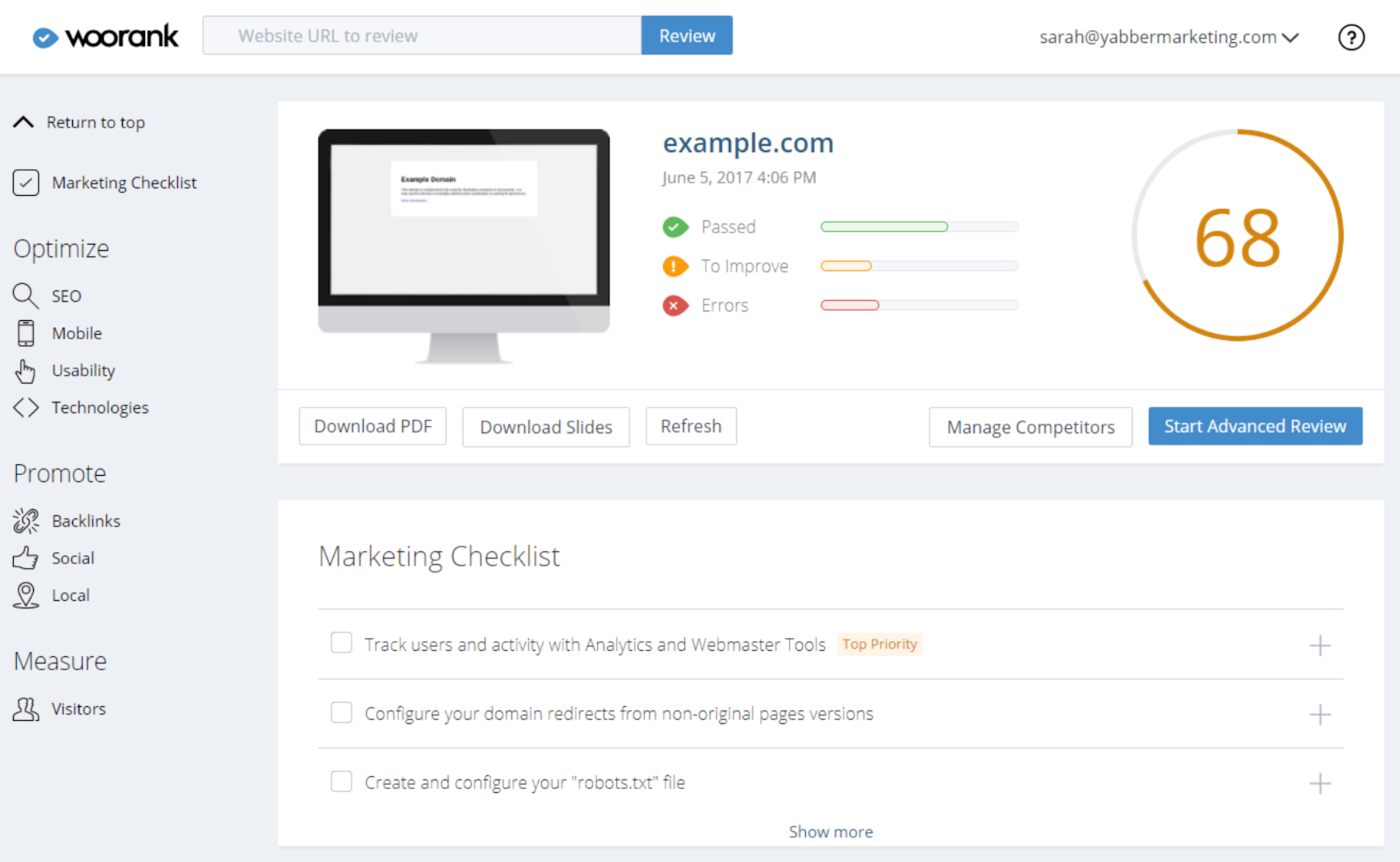
As a top SEO analysis tool, Woorank offers free and paid options to track and report your marketing data. You can plug in your competitors to discover which keywords they are targeting so you can overlap with theirs. Try understanding how keywords perform over time to optimize for users and search engines in the best way possible. And most importantly, understand the things your website is lacking from both a technical and content perspective. Woorank can help you identify duplicate content, downtime, and security issues and provide guidelines on how to fix them.
10. Majestic: Marketing SEO Tools

Majestic is one of the best marketing SEO tools according to experts. It has countless useful features like The Majestic Million which lets you see the ranking of the top million websites. Did your website make the cut? The Site Explorer feature allows you to easily see a general overview of your site and the number of backlinks you have. It also works as an SEO keyword tool to find the best keywords to target while also having features geared to site comparisons and tracking your rank.

Ryan Scollon, SEO Consultant at RyanScollon.co.uk recommends the SEO tool Majestic. He says, “My favorite SEO tool is Majestic, with its main feature allowing you to check the backlinks of a website that you specify. My favorite feature is the ability to add your own client’s site and a bunch of competitors, allowing you to easily compare a variety of SEO metrics such as trust flow, referring domain count, and external backlinks count. Not only does it help us understand the [client’s optimization] weaknesses, but it also provides a simple table that we share with our clients, so they too can understand the problems and how they stack up to their competitors. We also use Majestic to audit competitors’ backlinks, as we can sometimes find a handful of easy opportunities to tackle before moving onto other link building tactics.”
seo platform
An SEO platform provides a holistic solution to a number of digital marketing and organic search needs through built-in technology to optimize workflow, productivity, user management, and advanced reporting capabilities. Additionally, SEO platforms can integrate data and processes that span departments or teams (often including access to an API) and easily and reliably integrate with the major analytics providers, like Google Search Console, Google Analytics, Adobe Analytics, Coremetrics, and Webtrends, as well as content mangement systems like Adobe Experience Manager, web backlink software like Majestic SEO, and a variety of social platforms.
Another aspect of enterprise-grade SEO software is seen in the team of support provided to customers. These range from SEO experts to experts on the technology itself and include customer success managers, solutions managers, online support, and professional services consultants.
See the BrightEdge SEO Platform in Action!
SEO Tools
Most SEO tools serve a single purpose and are designed to help with one specific area of your business or SEO. For example, it’s easy to find tools that help marketers with keyword research, link analysis, or analytics, but it’s rare that one of these tools would provide more than one function let alone all the functions needed to run a successful SEO practice. SEO tools sometimes have limits restricting their ability to scale up to the volume of keywords and pages an enterprise user might need. This means users will need to toggle between different tools and manually manipulate data from different sources in order to gain a holistic view of the true performance of your website content.
What Should an SEO Platform Provide?
The best SEO platforms should address the following functionality:
- Managing keyword and content discovery
- Creating optimized content
- Analyzing backlinks
- Auditing the site for technical and performance issues that affect SEO
- Measuring SEO rank and business results on a site-wide and page-by-page basis
- Creating compelling dashboards that help elevate SEO wins
- Forecasting the ROI of tactics and strategies
- Enabling collaboration and coordination across teams
- On-platform and live human support
- Assigning and tracking tasks and events
- Self-guided certification
- Integration with other software and analytics
Search engines aim to deliver results that best address their audience’s needs. Because of this, the SERPs are constantly updating, creating both opportunities and challenges for SEO and content marketers. Successful SEO is the result of proper digital marketing where every element of your marketing strategy is fully optimized. Succeeding in SEO requires that your web pages are relevant, original, and authoritative to satisfy the search engine’s algorithms for specific topics.
Matching your content to search ranking factors and user intent means the amount of data you need to track and analyze can be overwhelming. To be effective at scale requires an SEO platform to decipher the data in a way that allows you to take action. Your enterprise SEO solution needs to not only show your ranking position for each keyword, but also provide actionable insights in an instant given the ever-changing world of SEO.
SEO Platform Framework
Every website is different and your SEO strategy will be unique to your business’ objectives and goals. However, there is a basic framework you should consider when evaluating SEO platforms. The following 5 capabilities are essential to executing a successful SEO strategy. Ensure the SEO platform you select will help you succeed at each of these critical functions.
1. Technical SEO
First and foremost, an SEO platform should identify and prioritize site errors, so your content outperforms the competition on search engines.
BrightEdge ContentIQ is an advanced site auditing solution that can support site crawls for millions of pages. ContentIQ helps by prioritizing website errors based on how they impact site performance. With the BrightEdge SEO platform, this technical SEO auditing solution is fully integrated into reporting and recommendations, allowing for automated error alerts and direct integration into analytics reporting.
2. Discover Search Demand
At the heart of every successful SEO campaign is research. Strong SEO platforms help you discover, prioritize, segment and track keywords easily. This is a distinct advantage over SEO tools which may provide one or two of these functions, but rarely all four.
Data Cube is the industry’s most powerful SEO research solution to help you prioritize and formulate successful search and content strategies. Conduct keyword research, evaluate a website’s organic presence and rank and conduct competitive analysis all from one easy-to-use interface. Powered by DataMind, Data Cube reveals which web page URLs and content types are winning the top spots on the SERP (search engine results pages) for any keyword.
The SERP layout is always changing with various content types taking over the precious above-the-fold space on the SERP. Your SEO platform should be able to evaluate the true organic ROI for every keyword and judge whether your content is strong enough to win the top positions. That way you can easily segment your target SEO keywords into smaller groups and build strategies to defend your winning content, optimize existing content, create new content or pull in PPC team to maximize high-quality traffic acquisition for the website.
Additionally, if your business operates in multiple cities you’ll need to conduct specific research in each market. This is where HyperLocal helps differentiate the BrightEdge SEO platform from the competition. The same search query from two adjacent cities will often yield different search results and have different search volume. HyperLocal provides the search volume and ranking data for each keyword in every city or country that Google Search supports. HyperLocal helps you connects the dots between online search behavior and increased foot traffic to your locations.
Finally, your SEO platform should feel like an organic data analyst pulled together everything relevant to your website’s performance and laid out the recommended strategies to improve content, ranking and technical issues so you can improve your website with confidence.
3. Benchmark the Competition
In SEO, it’s important to know your competition and stay a few steps ahead of them at all times. A good SEO platform should give you an easy way to understand the search landscape and identify who is winning the top spots for the keywords you want to own. Ideally, it can help you discover high-performing keywords that your competitor owns and provide actionable insights as to how they’re outranking you.
Keyword Gap Analysis is an indispensable tool that helps marketers do just that. By comparing the keywords of a domain or a URL of a competing site against your own site, you’re able to quickly identify gaps in your content. Use tools like this to create a content strategy and outrank your competition.
Another key way to analyze the competition is through Share of Voice. Calculating your organic Share of Voice based on the ranking position of you, your competitors and the total addressable search market can be a daunting task. A robust SEO platform should make this easy by doing the heavy-lifting for you and giving you a snapshot of where you stand amongst your competitors on the SERP. Find your organic competitors for any keyword and content category with a click of a button. In the BrightEdge SEO platform, the Share of Voice tool automatically dissects competitors’ web page content to help you ideate content strategies to win back the market share in organic search.
Backlinks are a useful measuring stick for search engines to grade the relevance and authority of websites. BrightEdge provides page-level backlink recommendations based on the top-10 ranking pages on the SERP, helping you identify authoritative links you might not have. Using artificial intelligence, the BrightEdge SEO platform automatically surfaces authoritative backlinks recently acquired by you or new competitive backlinks for you to target.
4. Create and Optimize Content
Improving the organic performance of an enterprise-sized site can be hard, but with an SEO platform you get prescriptive instructions for every page. This makes scaling content improvements and increasing organic rank easy. As SEO and content operate hand in hand, knowing what content to create or optimize and which technical enhancements to launch will make your organic strategy successful.
In the BrightEdge SEO platform, Recommendations compares each page vs. the top-10 ranking pages in the SERP to give prescriptive page-level recommendations. By pairing multiple keywords per page for the highest impact, Recommendations will help you improve organic visibility and relevance for your content.
5. Measure Results
An effective SEO platform needs robust reporting. With organic search constantly changing, you need to know where you are winning, where you can grow and what optimization plans worked, so you can scale further. The basic reports should provide key metrics and KPIs for every keyword you track. Sophisticated SEO platforms will go deeper and provide customizable reports pulling from multiple data sets. There should also be dashboards that make it easy to report wins and losses to colleagues and executives.
The best marketers are storytellers and SEO marketing is no exception. BrightEdge StoryBuilder has robust and flexible visualization capabilities to help you advocate the importance of the website and the contribution of SEO. Using executive dashboards to showcase the positive impact on brand equity and revenue from website optimization efforts will help you build convincing business cases for additional resources.
BrightEdge Opportunity Forecasting makes it easy to develop projections of SEO initiatives by calculating the total addressable market and your potential gains in revenue or site traffic with the push of a button. Building quantifiable business cases is critical to help secure the resources necessary for organic search success.
Conclusion
Let us know your thoughts in the comment section below.
Check out other publications to gain access to more digital resources if you are just starting out with Flux Resource.
Also contact us today to optimize your business(s)/Brand(s) for Search Engines
